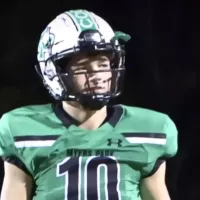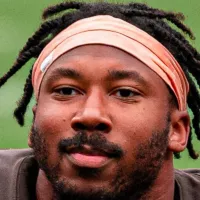June 1925: Barcelona Sporting Club's 1st squad
In June 1925, Barcelona Sporting Club had its first squad. The coach was Eutimio Pérez.
1927: Team crest change
In 1927, Barcelona S.C. changed their crest from a modified version of the city of Barcelona's Coat of Arms.
1935: Team crest change
In 1935, Barcelona S.C. made a major change to their crest, using Barcelona's flag in a circle, with a triangle bearing the team's initials.
1950: Barcelona Sporting Club wins its first AFG amateur title
In 1950, Barcelona Sporting Club won its first AFG amateur title.
1951: The Association turned professional
In 1951, the Asociación de Fútbol del Guayas turned professional.
1955: Team crest change
In 1955, after winning their first Guayas Championship, Barcelona S.C. adopted their current crest, which is similar to FC Barcelona's with some changes.
1959: Move to Estadio Modelo
In 1959, Barcelona S.C. moved to Guayaquil's new Estadio Modelo, sharing it with Emelec and Patria.
1960: Barcelona wins its first national title
In 1960, Barcelona Sporting Club won its first national title and became the first Ecuadorian team to compete in the Copa Libertadores.
1967: Barcelona racked up five professional regional titles
Between 1951 and 1967, Barcelona Sporting Club won five professional regional titles and finished as runners-up six times, tying crosstown rival Emelec for the most titles.
1971: Barcelona reaches the semi-finals of Copa Libertadores
In 1971, Barcelona Sporting Club reached the semi-finals of the Copa Libertadores with a team featuring Brazilian international Jose Paes, Peruvian World Cup player Pedro Pablo León, and Ecuadorian legend Alberto Spencer. They managed to defeat three-time tournament winner Estudiantes de La Plata 1–0 in La Plata, recognized as La Hazaña de la Plata.
1971: Barcelona wins first national title since 1971
In 1980, Barcelona Sporting Club won their first national title since 1971.
1972: Beginning of a dry spell
After the 1972 season, Barcelona Sporting Club entered a dry spell that would last nine years without winning a national title or qualifying for the Copa Libertadores.
1972: Barcelona reaches the semi-finals again
In 1972, Barcelona Sporting Club reached the semi-finals of the Copa Libertadores for the second consecutive year.
1973: "El derecho de los pobres" movie
In 1973, international filmmaker Filmadora Panamericana made a movie titled "El derecho de los pobres", starting Spanish-Mexican actor Enrique Rambal, Mexican actor Enrique Rocha and Ecuadorian football player Alberto Spencer, proclaimed the best Ecuadorian football player of all times, makes his cinema debut.
1980: Barcelona wins first national title since 1971
In 1980, Barcelona Sporting Club won their first national title since 1971.
1986: Barcelona reaches the Copa Libertadores semi-finals
In 1986, Barcelona Sporting Club reached the semi-finals of the Copa Libertadores.
1986: First block of the stadium put up
In 1986, the first block of Barcelona S.C.'s own stadium, Estadio Monumental, was put up, initiated by president Isidro Romero Carbo.
1986: Acquisition of key international players
In 1990, Barcelona Sporting Club acquired key international players, including former Argentine international and World Cup champion in 1986 Marcelo Trobbiani, Argentine international Alberto Acosta, and Uruguayan Marcelo Saralegui, aiming to conquer the Copa Libertadores.
1987: Inauguration of Estadio Monumental
In 1987, Barcelona Sporting Club inaugurated their new home ground, the Estadio Monumental, with an opening capacity of almost 90,000 spectators.
1987: Barcelona reaches the Copa Libertadores semi-finals
In 1987, Barcelona Sporting Club reached the semi-finals of the Copa Libertadores.
1987: Estadio Monumental Opened
In 1987, Estadio Monumental opened for the first time. The stadium was the first in Ecuador to have suites, and became the largest in terms of capacity, with space for close to 90,000 fans.
1988: Barcelona defeats FC Barcelona in Guayaquil City Cup friendly
In 1988, Barcelona Sporting Club hosted and defeated FC Barcelona from Spain 2–1 during the Guayaquil City Cup friendly.
1990: Acquisition of key international players
In 1990, Barcelona Sporting Club acquired key international players, including former Argentine international and World Cup champion in 1986 Marcelo Trobbiani, Argentine international Alberto Acosta, and Uruguayan Marcelo Saralegui, aiming to conquer the Copa Libertadores.
1990: Copa Libertadores quarter-final
In 1990, on August 29, Barcelona de Guayaquil faced Emelec in a Copa Libertadores quarter-final second leg, advancing to the semi-finals after a 1–0 win.
1990: Barcelona reaches Copa Libertadores final
In the 1990 Copa Libertadores edition, Barcelona Sporting Club beat River Plate of Argentina in a penalty shoot-out in a dramatic semi-final series, to finally reach the long-awaited final but lost against Olimpia of Paraguay.
December 1993: Death of Carlos Muñoz
On December 26, 1993, Ecuadorian striker Carlos Muñoz died in a car accident at the age of 26, three days after Barcelona Sporting Club had achieved second place in the Ecuadorian league.
1997: Barcelona did not win a national title
Barcelona Sporting Club did not win a national title for 15 years since 1997.
1997: Barcelona wins Ecuadorian league title
In 1997, Barcelona Sporting Club won the Ecuadorian league title with the help of players such as Marco "El Diablo" Etcheverry, Anthony "El Pipa" De Avila, and Agustin "Tin" Delgado.
1998: Last appearance in Copa Libertadores final
1998 was Barcelona Sporting Club's last appearance in the Copa Libertadores final as of 2022.
1998: Barcelona reaches Libertadores Cup final
In 1998, Barcelona Sporting Club reached their second Libertadores Cup final, losing both championship games against Brazilian team Vasco Da Gama.
1998: Barcelona reached the semi-finals of Copa Libertadores
In 2017, Barcelona Sporting Club reached the semi-finals of Copa Libertadores for the first time since 1998.
November 2007: Eduardo Maruri elected President of Barcelona
In November 2007, Eduardo Maruri was elected President of Barcelona Sporting Club for the 2007–11 period.
September 2008: LED perimeter board installation
In September 2008, a 243-meter LED perimeter board was installed in the Estadio Monumental Banco Pichincha, as part of a deal with Latin America Futbol Corporation.
2008: Basketball team champion in Ecuadorian National Basketball League
In 2008, the Barcelona Sporting Club basketball team won the Ecuadorian National Basketball League championship.
December 2010: Eduardo Maruri resigns the presidency of Barcelona
On December 22, 2010, Eduardo Maruri resigned the presidency of Barcelona Sporting Club due to "family issues".
June 2011: Antonio Noboa elected as the new president of Barcelona SC
On June 11, 2011, Antonio Noboa was sworn in as the new president of Barcelona Sporting Club.
2012: Barcelona wins Ecuadorian league title
In 1997, Barcelona Sporting Club won the Ecuadorian league title with the help of players such as Marco "El Diablo" Etcheverry, Anthony "El Pipa" De Avila, and Agustin "Tin" Delgado.
July 2015: Giant LED perimeter board debut
On July 12, 2015, a giant LED perimeter board, the biggest in South America, was debuted in the Estadio Monumental Banco Pichincha.
December 2015: José Francisco Cevallos assume the presidency of Barcelona
On December 13, 2015, José Francisco Cevallos assumed the presidency of Barcelona Sporting Club.
2015: Home kit color change
Since 2015, Barcelona S.C.'s home kit has been all yellow, as part of the moorlands era.
2017: Barcelona reached the semi-finals of Copa Libertadores
In 2017, Barcelona Sporting Club reached the semi-finals of Copa Libertadores for the first time since 1998.
2020: José Francisco Cevallos term ended
José Francisco Cevallos term as president of Barcelona Sporting Club ended in 2020, but was renewed.
2020: Barcelona won the 2020 Ecuadorian Serie A Championship
José Francisco Cevallos' term ended with a gleeful 2020 Ecuadorian Serie A Championship, and then was re-elected Club President.
August 2021: Scheduled start of "Aerovia" connection
In August 2021, the aerial lift or cable car currently under construction will connect the stadium with the "Aerovia" Julian Coronel station in downtown Guayaquil, which service is scheduled to start.
2021: Barcelona reached the semifinals of the 2021 Copa Libertadores
In 2021, Barcelona Sporting Club reached the semifinals of the Copa Libertadores.
2022: Last appearance in Copa Libertadores final
1998 was Barcelona Sporting Club's last appearance in the Copa Libertadores final as of 2022.
Mentioned in this timeline

Basketball is a team sport played on a rectangular court...
FC Barcelona or Bar a is a professional football club...
Serie A is the top-tier professional football league in Italy...

Football is a family of team sports primarily involving kicking...

Barcelona is a major city located on the northeastern coast...
Argentina officially the Argentine Republic is located in the southern...
Trending
Alex Highsmith is a professional American football linebacker currently playing for the Pittsburgh Steelers in the NFL Before joining the...

6 months ago Drake Maye and Wife Ann Michael Donate Wedding Gifts to Local Shelter
Jaylen Waddle is a professional American football wide receiver currently playing for the Miami Dolphins in the NFL He was...
2 months ago Michael Pittman Jr. injury update: Status against Falcons in Week 10; Set to play.
7 months ago Stefanski Praises Sanders; Browns QB Competition Remains United, Not Dysfunctional This Offseason.

5 months ago Myles Garrett sets Super Bowl goal, Stefanski faces pressure, DPOY odds revealed.
Popular

XXXTentacion born Jahseh Dwayne Ricardo Onfroy was a controversial yet...

Stranger Things created by the Duffer Brothers is a popular...
The Kennedy Center Honors are annual awards recognizing individuals and...
Turning Point USA TPUSA is an American nonprofit organization founded...

Candace Owens is an American conservative political commentator and author...

William Franklin Graham III commonly known as Franklin Graham is...